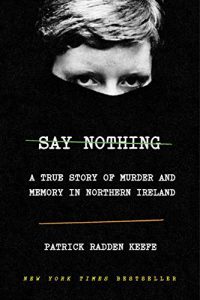
Growing up in the ’70s and ’80s, I was aware of sectarian violence in Northern Ireland—I heard news reports of IRA bombings and hunger strikes—but I definitely didn’t have a clear understanding of the issues. Therefore, when Patrick Keefe published Say Nothing: A True Story of Murder and Memory in Northern Ireland to rave reviews earlier this year, I figured it would be an educational and engaging read. I wasn’t disappointed.
As its subtitle suggests, Say Nothing follows some conventions of the true crime genre. The book begins with the 1972 abduction of Jean McConville, a mother of 10, from her apartment in a public housing complex in West Belfast. Twenty-some chapters later, in 2003, her remains are uncovered on a beach in the Republic of Ireland, just south of the border with Northern Ireland. A pathologist’s report suggests she died from a single gunshot to the back of the head.
The “whodunit” thread definitely runs throughout the narrative, sometimes surfacing as a major plot point, but just as often fading into the background. My sense is that Keefe’s primary interest is in using McConville’s disappearance as a springboard for his broader exploration of the period known as the Troubles—three decades of violence centered in Northern Ireland, beginning in the late 1960s and running through approximately 1998.
My takeaways from reading the book include a more granular understanding of the differences between the Official IRA, the Provisional IRA, and Siin Féin; greater awareness of the various roles played by Gerry Adams during the Troubles, as well as insight into why he is such a controversial figure; and the sobering realization that Bobby Sands was actually one of ten hunger strikers who died at intervals over the summer of 1981.
Say Nothing is exactly the kind of nonfiction book I enjoy. It taught me something new without giving off a dry textbook vibe. It’s also given me a more nuanced understanding of how tensions from the past inform present day concerns—in this instance, related to Brexit. Chief among these concerns is what impact the United Kingdom’s exit from the European Union will have on the border between Northern Ireland and the Republic of Ireland.
Speculation also swirls that Brexit may tip the scale toward Irish unification—a longstanding republican dream. As Keefe writes, “[i]t would be ironic, to say the least, if one inadvertent long-term consequence of the Brexit referendum was a united Ireland—an outcome that three decades of appalling bloodshed and some thirty-five hundred lost lives had failed to achieve.”
Overall, this book is a powerful reminder of William Faulkner’s assertion that “[t]he past is never dead. It isn’t even past.”
Keefe, Patrick Radden. Say Nothing: A True Story of Murder and Memory in Northern Ireland. New York: Doubleday, 2019.

